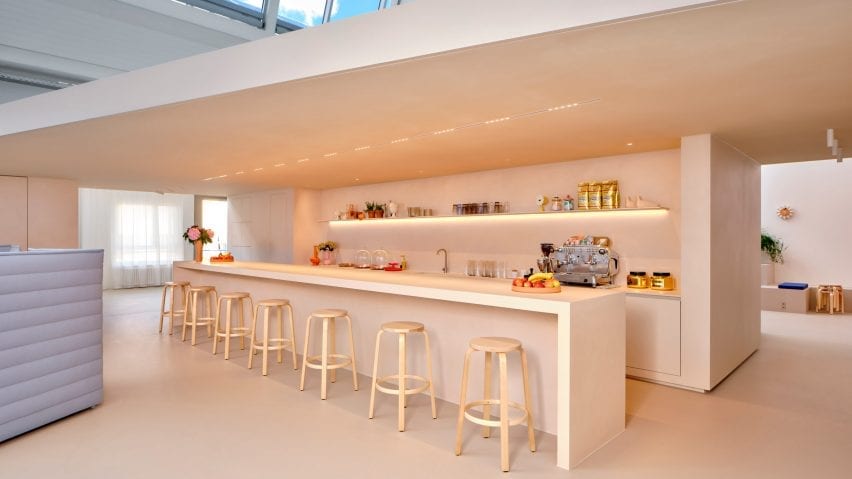Dezeen promotion: Swiss furniture brand Vitra has created a workspace called the Club Office that aims to reinvent the office as a collaborative environment focused on the emerging needs of post-pandemic work.
Installed at Vitra's headquarters in Birsfelden near Basel, the Club Office was developed for Vitra's research and design team and responds to the unprecedented changes that have unfolded in the world of work in the last fifteen months.
It is an open-plan office alternative divided into public, semi-public and private spaces that offer three different working models that can be viewed and enjoyed by visitors and staff alike. It provides a productive place of belonging, where employees feel they are part of a larger whole.
"Those who choose to go to the office today and in the future do so consciously – to meet colleagues and experience a sense of belonging and appreciation," said Nora Fehlbaum, CEO of Vitra.
"The office must be more than just a place of work, today, an office needs to provide added value."
"If an office has no character and colleagues hide from one another, it's better to spare the commute and stay at home."
The Club Office's public area is a welcoming space for informal meetings, discussion, collaboration, debate and mutual learning.
Comfortable and inviting designs from Edward Barber and Jay Osgerby, including Soft Work, a modular sofa system with ergonomic functions, sit next to Vitra's newly launched Alcove Plus sofa, characterised by its side panels and extra-high back and designed by Ronan & Erwan Bouroullec.
"In post-Covid offices, the extended and versatile Alcove family has become even more relevant, offering infinite possibilities to structure open plans and to create flexible room-like spaces without the need for permanent installations," said Christian Grosen, chief design officer at Vitra.
The semi-public area is used for project work. Members come together on a planned basis in spaces that can be reserved and used often over a period of days and weeks. Here, furniture is chosen for its flexibility so that space can be quickly reconfigured and adapt to group activities.
The room is made up of Dancing Walls, Vitra's flexible partitions designed by Stephan Hürlemann; Stool-Tool, a stackable stool by Konstantin Grcic; and Tip Ton, an Edward Barber and Jay Osgerby chair designed to improve the user's posture.
The Club Office's private zone is made up of individual workspaces that "extends into the home office, which has proven particularly suitable for concentrated individual tasks".
Ergonomic seating was essential to the private zone's design. This includes Vitra's ID Chair Concept range, which now offers one hundred per cent recyclable configurations and a highly breathable PU-foam-free seat (manufactured from recyclable polyester fibres), and the new ID Cloud Chair designed in collaboration with Italian architect and furniture designer Antonio Citterio.
The ID cloud has a backrest that "enables a novel floating sensation for the sitter with exceptional freedom of movement," according to Vitra.
The Club Office aims to meet the needs of the post-pandemic workforce and opens in Vitra's head office in Basel on 10 June.
"It combines as many different options for collaboration and interaction as possible and presents a powerful signal that the world of work has changed, and so have we," said Nora.
Vitra is now developing a number of Club Offices for clients including the Merantix AI Campus in Berlin. Learn more in Vitra’s latest E-Paper which can be downloaded here.
More information about Vitra's Club Office can be found on Vitra's website.
Photography is by Vitra and Eduardo Perez unless otherwise stated.
Partnership content
This article was written by Dezeen for Vitra as part of a partnership. Find out more about Dezeen partnership content here.

